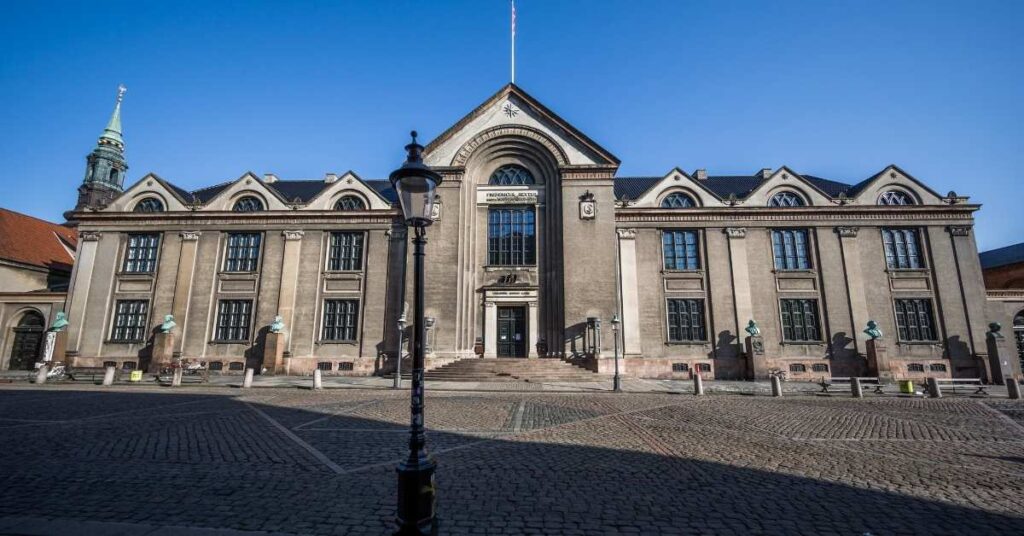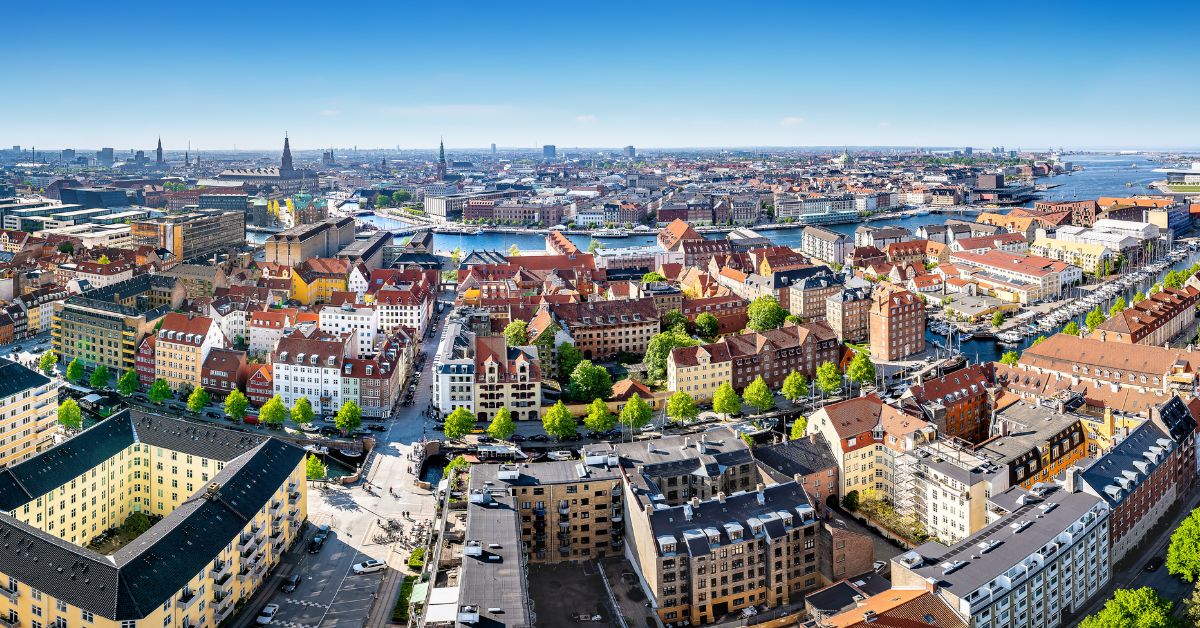The Demographics of Denmark reveal a total population of about 6 million people. Despite its small size, Denmark boasts a diverse population, with cities like Copenhagen. It is a vibrant hub of various cultures. The rural areas showcase traditional Danish lifestyles.
Understanding the demographics of Denmark is essential for expats. It helps them adjust to life in a new country. Knowing about local people, their ages, and where they live is important. It assists expats in blending into the community. It also makes interacting at work easier.
For those moving to Denmark, this knowledge is invaluable. Denmark is known for happiness and a high quality of life. It has excellent healthcare, education, and a balance between work and life. But, adapting to Danish life needs an understanding of local customs. This is where demographics play a big role.
The demographics of Denmark influence many aspects. These include social behaviors and government policies. For example, the aging population affects healthcare services. It also impacts the pension system. Therefore expats need to understand these factors. This understanding helps in making better life choices in Denmark.
Denmark’s commitment to equality and environmental care is also notable. This is reflected in its social policies and lifestyle. Expats will find a society that values fairness and sustainability. This understanding shapes how one lives and works in Denmark.
For expats, grasping Denmark’s demographic details is crucial. It helps in understanding local traditions and work culture. This knowledge makes integrating into Danish society smoother. Whether for work, study, or leisure, understanding the demographics of Denmark is a step towards a successful expat life.
Population Distribution and Density
Denmark’s population is not spread evenly across the country. Most people live in urban areas. Copenhagen, the capital, is the most populated. It’s a hub for business, culture, and education. Aarhus and Odense are other major cities with dense populations. These cities offer a lively lifestyle and diverse job opportunities.
In contrast, rural areas in Denmark are less populated. They offer a quieter, more nature-focused lifestyle. Expats looking for peace might prefer these areas. Rural Denmark is known for its natural beauty and slower pace of life.
The demographics of Denmark are exemplified by Copenhagen’s high population density. Here a large number of people reside in a compact area and creates a bustling city filled with activities and opportunities. Expats in Copenhagen can immerse themselves in a vibrant city life, enjoying a blend of modern amenities and historical charm.
The demographics of Denmark also show diversity in the population. The country has also seen an increase in diversity over the years. This is especially true in urban areas. Expats will find communities from different races and cultures in cities. This multicultural environment enriches the expat experience in Denmark.
For expats, understanding the population distribution is vital. It impacts daily life, from commuting to social interactions. In cities, public transport is widely used due to high population density. In rural areas, having a car might be more necessary.
Knowing the Denmark population by race is also important. It helps expats understand the cultural dynamics of their new home. Denmark’s growing diversity is a sign of its welcoming nature. Expats can look forward to a multicultural experience, especially in urban areas.
Age Structure and Trends in the Demographics of Denmark

Denmark’s population has a broad age range. However, there’s a notable trend towards an aging population. This means a larger percentage of elderly people. In contrast, the youth population (those under 18) is relatively smaller. This trend is common in many developed countries.
Copenhagen demographics reflect this national trend. The city has a mix of young professionals and older residents. The presence of universities attracts younger people. Meanwhile, many elderly residents prefer the city’s conveniences and healthcare facilities.
The aging population in Denmark impacts various aspects of life. It influences healthcare services, pension systems, and the labor market. For expats, this means encountering a workforce with a broad age range. It also means a stable and well-developed healthcare system.
The birth rate in Denmark is moderate. It has been relatively stable in recent years. This stability contributes to a balanced demographic scenario. For expats, this means a stable and predictable social environment.
Denmark’s government and society adapt to these demographic trends. They focus on providing quality healthcare and social services. This is especially important for the elderly. For expats, it’s reassuring to know the country takes care of its residents at all ages.
An aging population also means a wealth of experience and knowledge. Expats can learn much from the older Danish population. They offer insights into Danish culture, history, and traditions. This intergenerational exchange enriches the expat experience.
In workplaces, the age diversity creates dynamic environments. Younger and older workers bring different perspectives. This diversity can lead to innovative ideas and approaches. It’s an exciting aspect for expats working in Denmark.
Predictions suggest the aging trend will continue. The government is preparing for this future. They are investing in healthcare and pension schemes. For expats, this shows Denmark’s commitment to its residents’ well-being.
Cultural Diversity and Ethnic Groups within the Demographics of Denmark
Denmark has historically been a homogenous country. This means for a long time, most people had similar cultural and ethnic backgrounds. The majority are ethnic Danes, with roots going back centuries. Their culture, traditions, and language have shaped Denmark’s identity.
However, in recent decades, this has been changing. Immigration has introduced more diversity. Now, Denmark’s demographics by race include various ethnic groups. These groups come from all over the world. They bring different cultures, languages, and traditions.
Cities like Copenhagen have become melting pots of cultures. Here, expats and immigrants from many countries live and work. This diversity has enriched Danish society. It has brought new perspectives, cuisines, and cultural celebrations.
For expats, this means a more inclusive environment. In urban areas, especially, they’ll find communities from various backgrounds. This diversity can make adjusting to life in Denmark easier for newcomers.
The role of immigration in shaping Denmark’s cultural landscape is significant. It has made Danish society more open and global. This is evident in the variety of restaurants, festivals, and art scenes. In Copenhagen, for example, one can experience food and art from many parts of the world.
The government recognizes the importance of integrating immigrants. They have programs to help newcomers settle in. These programs include language classes and cultural orientation. For expats, this support is valuable. It helps them understand Danish society better.
Denmark’s approach to multiculturalism is still evolving. The country strives to balance maintaining its heritage with embracing new influences. As an expat, witnessing this balance is fascinating. It offers a chance to experience traditional Danish culture and new global influences.
Language and Communication
In the demographics of Denmark, Danish, the official language, is spoken by the majority of the population, with various regional dialects that can significantly differ from the standard Danish commonly used in cities, especially in Copenhagen.
In recent years, English has become widely spoken in Denmark. This is especially true in business environments and larger cities. Many Danes speak English fluently. This is a relief for expats who may not speak Danish yet. However, learning Danish is still important.
Understanding and speaking Danish is key for social integration. It allows expats to connect more deeply with Danish culture. It also opens up more opportunities for socializing and understanding local customs. Learning the language shows respect for the host country. It helps in building stronger relationships with locals.
In business, knowing Danish can be advantageous, even though English is widely used. It can lead to better job opportunities and career growth. It shows commitment to living and working in Denmark. Danish in the workplace can also be crucial for understanding the nuances of business interactions.
The government offers Danish language courses for expats. These courses are often free or at a low cost. They are a great resource for new arrivals. They help in quickly picking up the language. Language classes are also a place to meet other expats and locals.
For expats with children, language is important in education. While international schools teach in English, local schools use Danish. For families planning a longer stay, local schools can be a good option. This helps children integrate and learn the language.
Educational Levels within the Demographics of Denmark

Denmark prides itself on a high-quality education system. This system serves people of all ages. Most Danes complete at least secondary education. Many go on to higher education in universities and colleges. The country has a strong emphasis on lifelong learning.
Statistics show that a significant portion of the Danish population has tertiary education. This includes university degrees and vocational training. The education system caters to various interests and career paths. For expats, this means living in a highly educated society.
The education system impacts workforce skills in Denmark. There is a focus on innovation and critical thinking. Skills like problem-solving and creativity are highly valued. These skills make the Danish workforce competitive and dynamic. This is an attractive environment for expats looking for work opportunities.
For expats with children, Denmark’s education system offers excellent opportunities. There are international schools, where classes are in English. But many expat families choose local schools to immerse their children in Danish culture and language. This helps in their social integration.
Higher education in Denmark is also appealing to expats. Universities offer numerous programs in English. These programs attract students from around the world. This creates a diverse and international academic environment.
The impact of education on Denmark’s workforce is significant. It contributes to the country’s high standard of living and innovation. For expats, this means working in a forward-thinking and progressive environment. It also means numerous opportunities for professional development.
The government’s investment in education reflects its value in Danish society. This investment ensures that the education system remains top-notch. It benefits not just Danes, but also expats living in Denmark. For expats, this means access to quality education for themselves and their families.
Employment and Economic Contribution
Denmark boasts a diverse and robust economy. The country is known for its strong sectors like renewable energy, pharmaceuticals, and information technology. Additionally, the service sector, including healthcare and education, plays a significant role. These industries offer various employment opportunities for both locals and expats.
Expats contribute significantly to the Danish economy. They bring skills and perspectives that enrich the workforce. Many expats work in sectors like IT, engineering, and healthcare. These fields often have a high demand for skilled professionals. Expats with expertise in these areas find Denmark an attractive place to work.
The overall employment rate in Denmark is high. This reflects the country’s healthy economy and effective labor market policies. For expats, this means a favorable job market with various opportunities. However, the competition can be strong in certain sectors. It’s important for expats to highlight their unique skills and experiences.
One trend in the Danish job market is the increasing importance of digital skills. The rise of technology in all sectors makes these skills valuable. Expats with digital expertise have a competitive edge. This is especially true in Copenhagen, where many tech companies are based.
Language skills also play a role in employment. While many Danes speak English, knowing Danish can be advantageous. It can open more job opportunities and help in workplace integration. Language courses offered by the government are a great resource for expats.
When you look at the demograpghics od Denmark the role of expats in key industries cannot be overstated. They help fill skill gaps in the Danish workforce. They also bring international experience to Danish companies. This is beneficial in a globalized economy. Expats also contribute to cultural diversity in the workplace.
Family Structure and Household Dynamics
In Denmark, family structures have evolved over time. Traditionally, Danish families were often large, with multiple generations living together. However, in recent years, there’s been a shift. Now, smaller family units are more common. Many families consist of parents and one or two children. Single-parent households are also not uncommon.
This change in family structure reflects broader societal shifts. These include greater emphasis on individual independence and career focus. For expats, this means encountering a variety of family setups. It also means more flexibility in defining their own family structures in Denmark.
Regarding housing trends, Denmark offers diverse options. In cities like Copenhagen, apartments are popular, especially among singles and young couples. These apartments are often close to amenities and workplaces. For families, suburban areas offer larger homes with more space.
Recently, there’s been a rise in co-housing communities. These are spaces where multiple families or individuals live together and share common areas. They offer a sense of community and shared responsibility. This trend is attractive to many, including expats seeking a close-knit living environment.
For expats, understanding these housing trends is important. It helps in making informed decisions about where to live. The choice of housing can impact lifestyle, commute times, and social interactions.
The cost of housing varies across Denmark. In major cities, housing can be more expensive. For expats, budgeting for housing is a key consideration. It’s important to research and plan accordingly. Many expats initially choose rental properties before deciding on long-term housing.
In conclusion, family structure and household dynamics are integral to the demographics of Denmark. They reflect the country’s cultural values and social changes. For expats, understanding these aspects helps in adapting to life in Denmark. It influences decisions on housing and integration into the community.
Health and Wellness in the Demographics of Denmark

The demographics of Denmark, with a population of around 6 million, benefit from a highly efficient and inclusive healthcare system. It emphasizes preventive care and healthy living. This system, accessible to both citizens and expats, contributes to the country’s overall well-being and impressive public health outcomes.
Denmark is known for its efficient healthcare system. It is largely publicly funded and accessible to all residents. This includes expats who have obtained residency. The system is known for its high standards and emphasis on preventive care. This approach contributes to the overall good health of the population.
Public health statistics in Denmark are impressive. Life expectancy is high, and the incidence of many chronic diseases is relatively low. These outcomes are partly due to the healthcare system’s efficiency and the healthy lifestyle of Danes.
Lifestyle factors play a big role in the health profile of Danes and expats. The Danish culture promotes an active lifestyle. Cycling is a popular mode of transportation, even in cities. This not only helps with physical fitness but also with mental well-being.
The Danish diet, rich in fish, whole grains, and vegetables, also contributes to good health. This balanced diet is easily accessible in Denmark. For expats, adopting these dietary habits can be a step towards healthier living.
Mental health is given importance in Denmark. Work-life balance is a part of the culture. This approach reduces stress and improves overall well-being. For expats, adapting to this balanced lifestyle can be beneficial.
Regular health check-ups
Preventive healthcare is a priority in Denmark. Regular health check-ups and screenings are common. This proactive approach helps in early detection and treatment of health issues. For expats, understanding and utilizing these services is important.
For families, the healthcare system offers comprehensive maternal and child health services. This is reassuring for expat families settling in Denmark. The system ensures that all residents, including children, receive proper healthcare.


